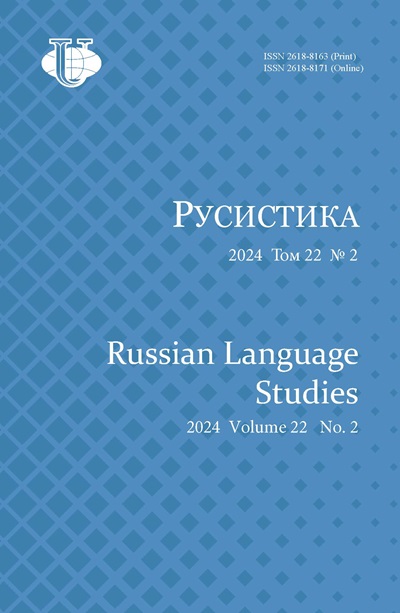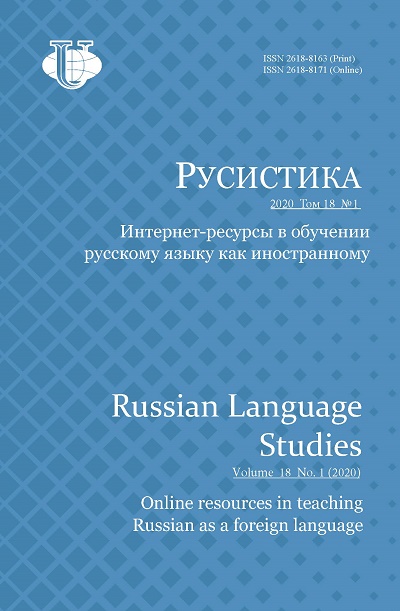Friendship as a reflective value in Chinese and Russian aphorisms: experience of linguistic and cultural concepts e-teaching
- Authors: Bai Y.1, Zheltukhina M.R.2
-
Affiliations:
- Xinjiang University
- Volgograd State Socio-Pedagogical University
- Issue: Vol 18, No 1 (2020): ONLINE RESOURCES IN TEACHING RUSSIAN AS A FOREIGN LANGUAGE
- Pages: 54-68
- Section: Mediadidactics and electronic means of instruction
- URL: https://journals.rudn.ru/russian-language-studies/article/view/23212
- DOI: https://doi.org/10.22363/2618-8163-2020-18-1-54-68
Cite item
Full Text
Abstract
The article is devoted to the current problem of modern linguodidactics, Russian language studies and linguoculturology - linguocultural concepts e-teaching in intercultural context on the material of the Russian language. The article deals with using information and communication technologies in teaching Russian as a foreign language in linguoculturological aspect. Methods of online learning Russian as a foreign language to Chinese students are offered. This study is based on methods of analytical description, systematization, generalization, comparative analysis, linguoconceptual and linguoaxiological analysis, e-learning. As the material of a research, Chinese and Russian aphoristic funds are used (more than 100 aphoristic statements containing lexemes friend , friendship , to be on friendly terms ). The article presents electronic educational teaching materials, which take into account students' specific communication competences formed in the process of studying Russian linguistic and cultural concepts in an intercultural context. Within the framework of a series of webinars (online seminars), the stages of axiological analysis of the concept friendship , verbalized in Chinese and Russian aphorisms, are revealed in the process of e-learning linguocultural concepts in an intercultural context by Chinese students studying Russian as a foreign language. The scientific novelty of the article lies in the fact that for the first time the article offers exercises for online teaching Russian as a foreign language with linguocultural concepts analysis in an intercultural context on the material of Chinese and Russian aphorisms. The article contributes to the development of linguoconceptology, linguoculturology, linguoaxiology, Russian language studies, methods of teaching Russian as a foreign language, e-learning in an intercultural context, and intercultural communication. The materials of the study can be used at classes on Russian as a foreign language, linguodidactics, intercultural communication, and translation theory and practice. The materials of the study could form the basis of an electronic textbook for teaching linguistic and cultural concepts in an intercultural context in the course of Russian as a foreign language.
About the authors
Yu Bai
Xinjiang University
Author for correspondence.
Email: youdengzi@163.com
Ph.D. (Philology), Assistant Professor, Head of the Language Service Center at the Institute of Foreign Languages
People's Republic of China, Xinjiang Uygur Autonomous Region, Urumqi Urban District, Urumqi, Tianshan DistrictMarina R. Zheltukhina
Volgograd State Socio-Pedagogical University
Email: zzmr@mail.ru
Dr.Sc. (Philology), Professor, Member of the Russian Academy of Natural Sciences, Professor of English Philology Department at the Institute of Foreign Languages, Head of the Scientific Research Laboratory “Discourse Linguistics”
27 Lenina Ave, Volgograd, 400066, Russian FederationReferences
- luchshikh onlain-kursov dlya izucheniya russkogo kak inostrannogo [18 best online courses for studying Russian as a foreign language]. Retrieved May 05, 2019 from: https://vsekursy.com/read/191-saity-i-kanaly-dlya-izucheniya-russkogo-kak-inostrannogo.html
- Aleshchanova, I.V., Frolova, N.A., Morozova, E.V., & Zheltukhina, M.R. (2017). Psycholo- gical and Acmeological Aspect of Educational Cognitive Competence Development. Advances in Social Science, Education and Humanities Research (ASSEHR) (CILDIAH 2017), 97, 19–24.
- Bai, Yu, & Zheltukhina, M.R. (2018). Axiological Diachrony of Chinese and Russian Aphorisms: Values and Standards of Communicative Behavior. Bulletin of the Moscow City University. Series: Philology. Theory of Linguistics. Linguistic Education, 2(30), 41–51. (In Russ.)
- Ci Hai. (2009). Shanghai Dictionary Publishing House. Shanghai, China. (In Chinese.)
- Confucius and his disciples, Analects of Confucius, Early Warring States Period, Chinese Encyclopedia Dictionary. Retrieved February 18, 2018 from: http://www.zwbk.org/ MyLemmaShow.aspx?lid=288363. (In Chinese.)
- Dmitrieva, E.I. (1998). Osnovnaya metodicheskaya problema distantsionnogo obucheniya ino- strannym yazykam cherez komp'yuternye telekommunikatsionnye seti Internet [The main methodological problem of foreign languages distance learning through computer telecommunication Internet networks]. Inostrannye yazyki v shkole [Foreign languages at school], 1, 6–11. (In Russ.)
- Informatsionnye tekhnologii v obuchenii inostrannym yazykam [Information technologies in teaching foreign languages]. Retrieved May 05, 2019 from: http://bit.edu.nstu.ru/ archive/issue-1-2006/ikt_v_obuchenii_inostrannym_yazykam:_regi_127
- Karasik, V.I., & Sternin, I.A. (2005). Antologiya konceptov [Anthology of Concepts]. Volgograd: Paradigma Publ. (In Russ.)
- Likhachev, D.S. (2007). Velikoe nasledie: zametki o russkom [Great Heritage: notes on the Russian]. Saint Petersburg: Logos Publ. (In Russ.)
- Mishatina, N.L. (2006). Linguoculturological concepts of speech development of high school students based on concepts of Russian culture. World of Russian word, 4, 76–80. (In Russ.)
- Mishatina, N.L. (2010). Dialog s kontseptami russkoi kul'tury: elektivnye integrirovannye kursy dlya predprofil'nogo i profil'nogo obucheniya: russkii yazyk, literatura, obshchestvoznanie [Dialogue with the concepts of Russian culture: elective integrated courses for pre-professional and specialized education: Russian language, literature, social science]. Moscow: Russkoe slovo Publ. (In Russ.)
- Online Xinhua Dictionary. Retrieved March 16, 2018 from: http://xh.5156edu.com/html5/ z83m11j336252.html
- Ostrikova, G.N., Zheltukhina, M.R., Zyubina, I.A., & Sidorova, I.G. (2018). Learning Via Visualization at the Present Stage of Teaching a Foreign Language. Astra Salvensis, VI(1), 601–607.
- Ozhegov, S.I., & Shvedova, N.Yu. Russian Language Interpretation Dictionary. Retrieved March 08, 2018 from: https://ozhegov.slovaronline.com/
- Pashaeva, K.G. (2017). To the question of teaching Russian as a foreign language by means of information and communication technologies. Bulletin of Moscow Region State University. Series: Pedagogics, 3, 113–119. (In Russ.)
- Pictograph dictionary. Retrieved February 10, 2018 from: http://www.vividict.com/
- Russkie aforizmy [Russian Aphorisms]. Retrieved November 12, 2013 from: http://aphorismos.ru/ communication/
- Shalina, I.V., & Pikuleva, Y.B. (2016). On Problem of Description of Linguoaxiological Analysis Method (on Material of Dialogic Communication of Speakers of Vernacular Culture). Nauchnyy dialog, 11(59), 121–132 (In Russ.)
- Shchukin, A.N. (1978). Osnovy metodiki ispol'zovaniya audiovizual'nykh sredstv obucheniya na zanyatiyakh po russkomu yazyku kak inostrannomu v vuze [The basics of method- logy of using audiovisual training aids at the lessons of Russian as a foreign language at a university]. [Author’s abstr. doc. ped. diss.]. Moscow. (In Russ.)
- Sherstobitova, I.A. (2016). Concept in the Methodology of Teaching Russian as a Foreign Language. Pedagogical Education in Russia (no. 11). Retrieved June 03, 2019 from: https://cyberleninka.ru/article/n/kontsept-v-metodike-prepodavaniya-russkogo-yazykakak-inostrannogo
- Sysoev, P.V. (2013). Informatsionnye i kommunikatsionnye tekhnologii v lingvisticheskom obrazovanii [Information and communication technologies in linguistic education]. Moscow. (In Russ.)
- Ushakov, D.N. (2001). Russian Language Interpretation Dictionary. Moscow: Veche Publ., Mir knig Publ. Retrieved March 08, 2018 from: https://ushakovdictionary.ru/
- Vidy onlain-obucheniya [Types of online training]. Retrieved May 05, 2019 from: https:// myownconference.ru/blog/index.php/vidy-online-obucheniya/















